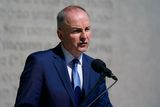New Irish Consulate for Manchester to ‘reinvigorate’ British-Irish relationship post-Brexit
‘The UK’s departure from the EU… requires us to rethink and reinvigorate the British-Irish relationship” – Taoiseach
Taoiseach Micheal Martin (Photo: Independent.ie)
Ireland is investing in its diplomatic footprint right across Britain in to response to the dislocating effects of Brexit, the Taoiseach said today.
A new Consulate General to the North of England will be opened in Manchester this summer.
It will bring the number of Irish diplomatic missions in Britain to four, comprising existing outreach in Scotland, Wales and to the heart of government in Westminster.
The new Consulate will join the recently opened Enterprise Ireland office there in Manchester, the Taoiseach told the British Irish Parliamentary Association.
It will deepen our collaboration with the ‘Northern Powerhouse’ of the UK that British Prime Minister Boris Johnson says he is building.
It will also enhance Ireland’s engagement with regional and local government on behalf of diaspora communities, Mr Martin said.
“The UK’s departure from the EU is a moment of dramatic and profound change. It requires us to rethink and reinvigorate the British-Irish relationship,” he told the body.
Ireland is also committed to deepening Ireland’s relationships with the devolved administrations in Cardiff and Edinburgh, Mr Martin said, carefully avoiding any comment on agitation for a second Scottish independence referendum, known as Indyref2.
But he said the Government had launched a Joint Review of Ireland-Scotland relations.
It will enhance our cooperation and collaboration over the coming five years, he said, even though Scottish First Minister Nicola Sturgeon is targeting a second plebiscite on independence for next year, aiming to dominate the local elections in May on the basis of that aim.
Ireland looks forward to a similar programme of cooperation with Wales in the near future, Mr Martin said, with the Government determine to strengthen East-West relations given that Britain and Ireland will no longer be partners among member states in Brussels.
Mr Martin said changes had been seen since the beginning of the year on trade flows and supply chains between Britain and Ireland as a result of Brexit.
"While we will continue to work to minimise disruptions where possible, the reality is that the UK is now outside of the EU’s single market and customs union, and the flow of goods between the UK and its neighbours is now subject to controls on both sides,” he said.
"This brings serious new complexities and challenges, but Britain is and will remain a key trading partner and an important market for Ireland.”
Referring to new talks between the EU and Britain on the operation of the Northern Ireland Protocol, Mr Martin said it was in the interests of all “to help our businesses manage this change.”
There was a particular need to support small and medium sized enterprises, “which provide so much employment across all jurisdictions on these islands,” he added.
But he warned that there was no version of Brexit that did not mean change – “especially in Northern Ireland where the Executive has been operating for little over a year following a long hiatus, and where there are many other important challenges on the agenda.”
The Taoiseach did not mention recent Loyalist threats to customs officers and veterinary inspectors at the ports of Belfast and Larne, which led to a weekend warning by Lord Trimble that there could be an outbreak of paramilitary violence.
But he said he warmly welcomed work between Brussels and London to move forward and to find ways of “easing implementation. “
This was “in a context where both sides have underlined their commitment to the Good Friday Agreement and the full implementation of the protocol,” the Taoiseach added.
The deal provided many benefits and opportunities for Northern Ireland, he noted. The six counties will now have unfettered access to the EU market while also remaining in the UK customs areas.
“It is right that we all work closely together to ensure that the Protocol works and that disruption is minimised to the greatest extent possible,” Mr Martin said, appearing to refer to red tape and bureaucracy rather than the threatened physical disruption of those who say they are opposed to a border in the Irish Sea.
Join the Irish Independent WhatsApp channel
Stay up to date with all the latest news














